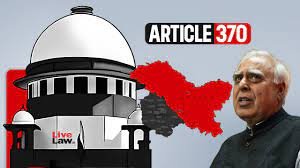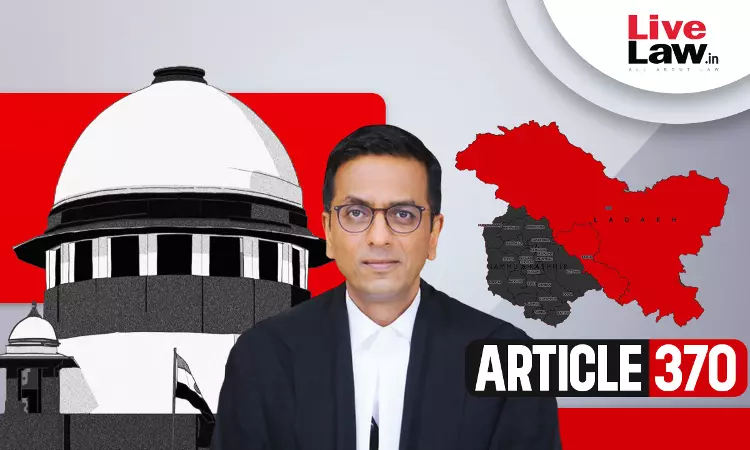September 19, 2023 | New Delhi
In a pivotal 16-day hearing, India’s Supreme Court examined the intricate facets of Article 370, which governs the relationship between the erstwhile state of Jammu and Kashmir and the rest of the country. Here’s a comprehensive overview of the arguments presented by the petitioners, emphasizing the enduring significance of Article 370.

In a riveting legal showdown, the fate of Article 370, a provision integral to Jammu and Kashmir’s unique constitutional status, hangs in the balance. A battery of legal luminaries, including names like Kapil Sibal, Gopal Subramanium, and Rajeev Dhavan, have passionately advocated for the petitioners, underscoring that the case holds far-reaching implications for the powers of state assemblies, Parliament, governors, and even the President.
The Supreme Court bench, comprising the Chief Justice of India DY Chandrachud and Justices Sanjay Kishan Kaul, Sanjiv Khanna, BR Gavai, and Surya Kant, heard arguments over an extensive 16-day period. In this two-part series, we delve into the critical arguments presented by the petitioners, emphasizing that their intention is not to question India’s sovereignty, but to affirm that Jammu and Kashmir remains an integral part of the nation.
Key Points:
- Unique Constitutional Framework: The framers of India’s Constitution envisioned a distinct association with Jammu and Kashmir, rooted in historical and geopolitical context.
- Instrument of Accession (IoA): The circumstances leading to the IoA signed by Maharaja Hari Singh highlighted J&K’s distinctive accession process compared to other princely states.
- Preservation of Autonomy: Article 370 safeguarded J&K’s autonomy, as there was no “merger agreement” akin to other states.
- Territorial Integrity Pledge: J&K was assured territorial integrity, setting it apart from other states.
- Constitutional Applicability: Over time, Indian laws were extended to J&K, leaving little to integrate, questioning the rationale behind Article 370’s abrogation.
- Founding Intentions: J&K’s Constitution was crafted by its Constituent Assembly, aligning with the broader ideals of India’s Constitution.
- Element of Permanence: The absence of changes recommended by the Constituent Assembly over six years implied a lasting intent for Article 370.
- Constituent Assembly’s Role: Article 370 required concurrence from the Constituent Assembly, which ceased to exist, lending it a sense of permanence.
- Synergy of Constitutions: India and J&K’s Constitutions coexisted, with Article 370 reflecting an asymmetric federal relationship.
- Abrogation Process Scrutinized: The abrogation process was challenged for bypassing the collaborative approach mandated by Article 370.
- Article 356 Intricacies: The executive act of invoking Article 356 was critiqued for sidestepping democratic principles, impacting federalism.
- State to Union Territory Transformation: The transformation of J&K into Union Territories raised constitutional concerns, disrupting representative democracy.
- Constitutional Democracy Upheld: It was argued that the Constitution doesn’t permit converting a state into two Union Territories without due process.
- Historical Context of Borders: J&K’s geographical connection to India was established through a historical decision by Lord Cyril Radcliffe.
- Special Dispensation for J&K: A unique arrangement was created for J&K, addressing both domestic and international considerations.
- Limited Power: Parliament’s authority under Article 370 was seen as circumscribed, contradicting claims of absolute power.
- Presidential Action and Council of Ministers: The President’s actions were viewed as contingent on the advice of the council of ministers, aligning with democratic principles.
- Parchment of Pride: J&K’s Constitution was held as a cherished document, symbolizing the state’s integral role in the Indian Union.
In a landmark hearing, India’s Supreme Court examined the constitutional nuances of Article 370, shedding light on its enduring relevance in the context of Jammu and Kashmir. The arguments presented emphasized the unique historical and geopolitical backdrop that shaped this constitutional provision. The hearing will play a pivotal role in defining the powers of various state entities and reaffirming the values enshrined in India’s Constitution.
For further details, refer to the full report on the Supreme Court’s hearing on Article 370.
Summary:
- The Supreme Court examines the enduring significance of Article 370 in a 16-day hearing.
- Arguments highlight the distinctive historical and geopolitical context of J&K’s association with India.
- The absence of a “merger agreement” and the IoA’s unique nature underscore J&K’s autonomy.
- The Constitution’s applicability to J&K raises questions about Article 370’s abrogation rationale.
- The hearing prompts a reevaluation of constitutional dynamics between J&K and the rest of India.
Disclaimer: The views and arguments presented in this article are based on the perspectives put forth by the petitioners in the ongoing legal battle over Article 370. The final judgment may provide further clarity on this complex constitutional issue.


